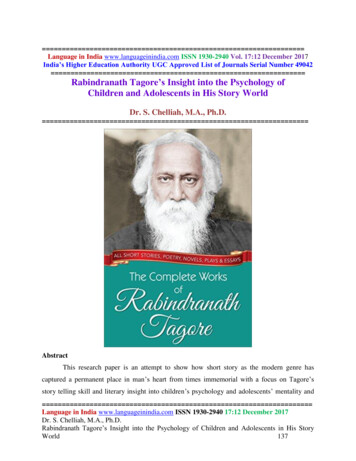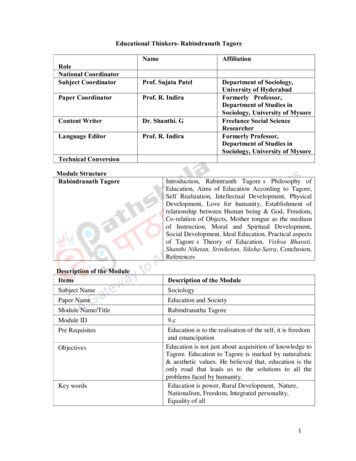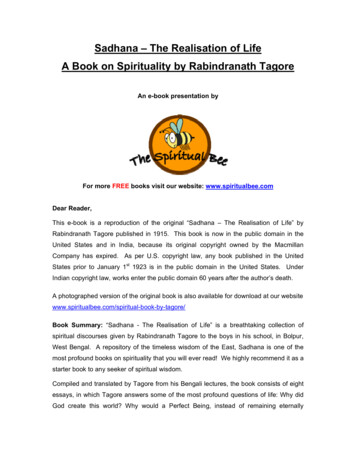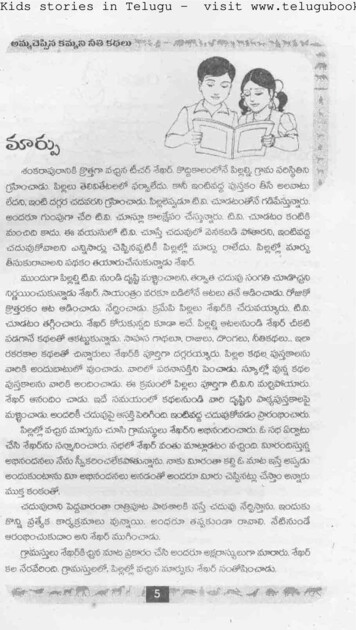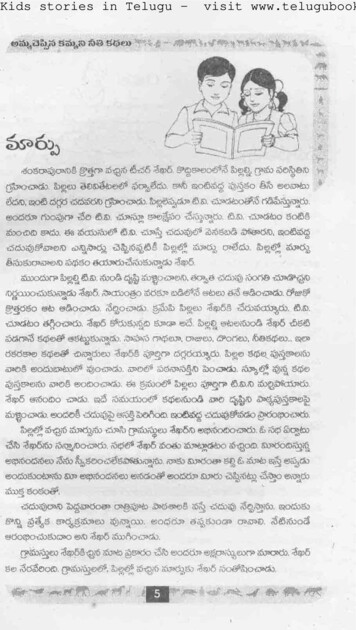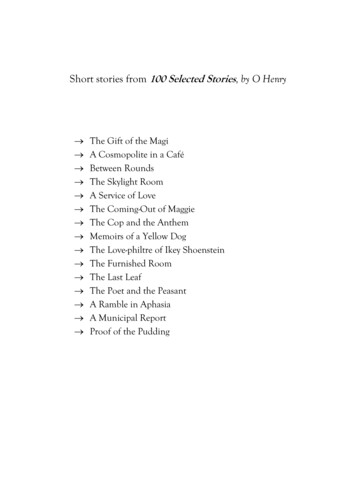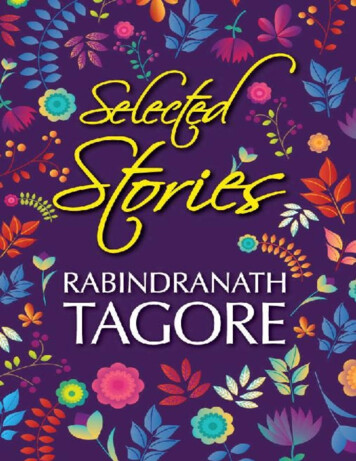
Transcription
Published by GENERAL PRESS4228/1, Ansari Road, Daryaganj New Delhi – 110002Ph. : 011 – 23282971, 45795759e-mail : generalpressindia@gmail.comwww.generalpress.in General PressAll rights reserved. No part of this publication may be reproduced, stored in a retrieval system, ortransmitted, in any form or by any means—electronic, mechanical, photocopying, recording orotherwise—without the prior written permission of the publishers.First Edition : 2014ISBN : 978938091477011092017
ContentsRabindranath TagoreThe CabuliwallahThe PostmasterThe Child’s ReturnThe Home-ComingOnce There was a KingMaster MashaiSubhaThe Babus of NayanjoreThe CastawayThe Son of Rashmani
Rabindranath TagoreRabindranath Tagore (1861-1941) was the youngest son of DebendranathTagore, a leader of the Brahmo Samaj, which was a new religious sect innineteenth-century Bengal and which attempted a revival of the ultimatemonistic basis of Hinduism as laid down in the Upanishads. He was educated athome; and although at seventeen he was sent to England for formal schooling, hedid not finish his studies there. In his mature years, in addition to his many-sidedliterary activities, he managed the family estates, a project which brought himinto close touch with common humanity and increased his interest in socialreforms. He also started an experimental school at Shantiniketan where he triedhis Upanishadic ideals of education. From time to time he participated in theIndian nationalist movement, though in his own non-sentimental and visionaryway; and Gandhi, the political father of modern India, was his devoted friend.Tagore was knighted by the ruling British Government in 1915, but within a fewyears he resigned the honour as a protest against British policies in India.Tagore had early success as a writer in his native Bengal. With his translationsof some of his poems he became rapidly known in the West. In fact his fameattained a luminous height, taking him across continents on lecture tours andtours of friendship. For the world he became the voice of India’s spiritualheritage; and for India, especially for Bengal, he became a great livinginstitution.Although Tagore wrote successfully in all literary genres, he was first of all apoet. Among his fifty and odd volumes of poetry are Manasi (1890) {The IdealOne}, Sonar Tari (1894) {The Golden Boat}, Gitanjali (1910) {Song
Offerings}, Gitimalya (1914) {Wreath of Songs}, and Balaka (1916) {TheFlight of Cranes}. The English renderings of his poetry, which include TheGardener (1913), Fruit-Gathering (1916), and The Fugitive (1921), do notgenerally correspond to particular volumes in the original Bengali; and in spiteof its title, Gitanjali: Song Offerings (1912), the most acclaimed of them,contains poems from other works besides its namesake. Tagore’s major plays areRaja (1910) {The King of the Dark Chamber}, Dakghar (1912) {The PostOffice}, Achalayatan (1912) {The Immovable}, Muktadhara (1922) {TheWaterfall}, and Raktakaravi (1926) {Red Oleanders}. He is the author of severalvolumes of short stories and a number of novels, among them Gora (1910),Ghare-Baire (1916) {The Home and the World}, and Yogayog (1929){Crosscurrents}. Besides these, he wrote musical dramas, dance dramas, essaysof all types, travel diaries, and two autobiographies, one in his middle years andthe other shortly before his death in 1941. Tagore also left numerous drawingsand paintings, and songs for which he wrote the music himself.
The CabuliwallahMy five-year old daughter Mini cannot live without chattering. I really believethat in all her life she has not wasted a minute in silence. Her mother is oftenvexed at this, and would like to stop her prattle, but I would not. For Mini to bequiet is unnatural, and I cannot bear it long. And so my own talk with her isalways lively.One morning, for instance, when I was in the midst of the seventeenth chapterof my new novel, my little Mini stole into the room, and putting her hand intomine, said: ‘Father! Ramdayal, the door-keeper, calls a crow a krow! He doesn’tknow anything, does he?’Before I could explain to her the difference between one language and anotherin this world, she had embarked on the full tide of another subject. ‘What do youthink, Father? Bhola says there is an elephant in the clouds, blowing water out ofhis trunk, and that is why it rains!’And then, darting off anew, while I sat still, trying to think of some reply tothis: ‘Father! What relation is Mother to you?’With a grave face I contrived to say: ‘Go and play with Bhola, Mini! I ambusy!’The window of my room overlooks the road. The child had seated herself atmy feet near my table, and was playing softly, drumming on her knees. I washard at work on my seventeenth chapter, in which Pratap Singh, the hero, hasjust caught Kanchanlata, the heroine, in his arms, and is about to escape with herby the third-storey window of the castle, when suddenly Mini left her play, andran to the window, crying: ‘A Cabuliwallah! A Cabuliwallah!’ And indeed, inthe street below, there was a Cabuliwallah, walking slowly along. He wore theloose, soiled clothing of his people, and a tall turban; he carried a bag on hisback, and boxes of grapes in his hand.
I cannot tell what my daughter’s feelings were when she saw this man, but shebegan to call him loudly. ‘Ah!’ thought I; ‘he will come in, and my seventeenthchapter will never be finished!’ At that very moment the Cabuliwallah turned,and looked up at the child. When she saw this, she was overcome by terror, andrunning to her mother’s protection, disappeared. She had a blind belief thatinside the bag, which the big man carried, there were perhaps two or three otherchildren like herself. The pedlar meanwhile entered my doorway and greeted mewith a smile.So precarious was the position of my hero and my heroine, that my firstimpulse was to stop and buy something, since Mini had called the man to thehouse. I made some small purchases, and we began to talk about Abdur Rahman,the Russians, the English, and the Frontier Policy.As he was about to leave, he asked: ‘And where is the little girl, sir?’And then, thinking that Mini must get rid of her false fear, I had her broughtout.She stood by my chair, and looked at the Cabuliwallah and his bag. He offeredher nuts and raisins, but she would not be tempted, and only clung closer to me,with all her doubts increased.This was their first meeting.A few mornings later, however, as I was leaving the house, I was startled tofind Mini, seated on a bench near the door, laughing and talking, with the greatCabuliwallah at her feet. In all her life, it appeared, my small daughter had neverfound so patient a listener, save her father. And already the corner of her littlesari was stuffed with almonds and raisins, the gift of her visitor. ‘Why did yougive her those?’ I said, and taking out an eight-anna piece, I handed it to him.The man accepted the money without demur, and put it into his pocket.Alas, on my return, an hour later, I found the unfortunate coin had made twiceits own worth of trouble! For the Cabuliwallah had given it to Mini; and hermother, catching sight of the bright round object, had pounced on the child with:
‘Where did you get that eight-anna piece?’‘The Cabuliwallah gave it me,’ said Mini cheerfully.‘The Cabuliwallah gave it you!’ cried her mother greatly shocked. ‘O Mini!How could you take it from him?’I entered at that moment, and saving her from impending disaster, proceededto make my own inquiries.It was not the first or the second time, I found, that the two had met. TheCabuliwallah had overcome the child’s first terror by a judicious bribe of nutsand almonds, and the two were now great friends.They had many quaint jokes, which amused them greatly. Mini would seatherself before him, look down on his gigantic frame in all her tiny dignity, andwith her face rippling with laughter would begin:‘O Cabuliwallah! Cabuliwallah! What have you got in your bag?’And he would reply, in the nasal accents of the mountaineer: ‘An elephant!’Not much cause for merriment, perhaps; but how they both enjoyed the fun! Andfor me, this child’s talk with a grown-up man had always in it somethingstrangely fascinating.Then the Cabuliwallah, not to be behindhand would take his turn: ‘Well, littleone, and when are you going to your father-in-law’s house?’Now nearly every small Bengali maiden had heard long ago about her fatherin-law’s house; but we were a little new-fangled, and had kept these things fromour child, so that Mini at this question must have been a trifle bewildered. Butshe would not show it, and with ready tact replied: ‘Are you going there?’Amongst men of the Cabuliwallah’s class, however, it is well known that thewords father-in-law’s house have a double meaning. It is a euphemism for jail,the place where we are well cared for, at no expense to ourselves. In this sensewould the sturdy pedlar take my daughter’s question. ‘Oh,’ he would say,shaking his fist at an invisible policeman, ‘I will thrash my father-in-law!’Hearing this, and picturing the poor discomfited relative, Mini would go off into
peals of laughter in which her formidable friend would join.These were autumn mornings, the very time of year when kings of old wentforth to conquest; and I, without stirring from my little corner in Calcutta, wouldlet my mind wander over the whole world. At the very name of another country,my heart would go out to it, and at the sight of a foreigner in the streets, I wouldfall to weaving a network of dreams—the mountains, the glens, and the forestsof his distant land, with his cottage in their midst, and the free and independentlife, or far away wilds. Perhaps scenes of travel are conjured up before me andpass and re-pass in my imagination all the more vividly, because I lead anexistence so like a vegetable that a call to travel would fall upon me like athunder-bolt. In the presence of this Cabuliwallah, I was immediately transportedto the foot of arid mountain peaks, with narrow little defiles twisting in and outamongst their towering heights. I could see the string of camels bearing themerchandise, and the company of turbaned merchants, some carrying their queerold firearms, and some their spears, journeying downward towards the plains. Icould see—. But at some such point Mini’s mother would intervene, and imploreme to ‘beware of that man’.Mini’s mother is unfortunately very timid. Whenever she hears a noise in thestreets, or sees people coming towards the house, she always jumps to theconclusion that they are either thieves, or drunkards, or snakes, or tigers, ormalaria, or cockroaches, or caterpillars. Even after all these years of experience,she is not able to overcome her terror. So she was full of doubts about theCabuliwallah, and used to beg me to keep a watchful eye on him.If I tried to laugh her fear gently away, she would turn round seriously, andask me solemn questions:Were children never kidnapped?Was it not true that there was slavery in Cabul?Was it so very absurd that this big man should be able to carry off a tiny child?I urged that, though not impossible, it was very improbable. But this was not
enough, and her dread persisted. But as it was a very vague dread, it did notseem right to forbid the man to the house, and the intimacy went on unchecked.Once a year, in the middle of January, Rahman, the Cabuliwallah, used toreturn to his own country, and as the time approached, he would be very busy,going from house to house collecting his debts. This year, however, he couldalways find time to come and see Mini. It might have seemed to a stranger thatthere was some conspiracy between the two, for when he could not come in themorning, he would appear in the evening.Even to me it was a little startling now and then, suddenly to surprise this tall,loose-garmented man laden with his bags, in the corner of a dark room; butwhen Mini ran in smiling, with her, ‘O Cabuliwallah! Cabuliwallah!’ and thetwo friends, so far apart in age, subsided into their old laughter and their oldjokes, I felt reassured.One morning, a few days before he had made up his mind to go, I wascorrecting proof-sheets in my study. The weather was chilly. Through thewindow the rays of the sun touched my feet, and the slight warmth was verywelcome. It was nearly eight o’clock, and early pedestrians were returning homewith their heads covered. Suddenly I heard an uproar in the street, and, lookingout saw Rahman being led away bound between two policemen, and behindthem a crowd of inquisitive boys. There were bloodstains on his clothes, and oneof the policemen carried a knife. I hurried out, and stopping them, inquired whatit all meant. Partly from one, partly from another, I gathered that a certainneighbour had owed the pedlar something for a Rampuri shawl, but had deniedbuying it, and that in the course of the quarrel Rahman had struck him. Now, inhis excitement, the prisoner began calling his enemy all sorts of names, whensuddenly in a verandah of my house appeared my little Mini, with her usualexclamation: ‘O Cabuliwallah! Cabuliwallah!’ Rahman’s face lighted up as heturned to her. He had no bag under his arm today, so that she could not talkabout the elephant with him. She therefore at once proceeded to the next
question: ‘Are you going to your father-in-law’s house?’ Rahman laughed andsaid: ‘That is just where I am going, little one!’ Then seeing that the reply didnot amuse the child, he held up his fettered hands. ‘Ah!’ he said, ‘I would havethrashed that old father-in-law, but my hands are bound!’On a charge of murderous assault, Rahman was sentenced to several years’imprisonment.Time passed, and he was forgotten. Our accustomed work in the accustomedplace went on, and the thought of the once free mountaineer spending his yearsin prison seldom or never occurred to us. Even my light-hearted Mini, I amashamed to say, forgot her old friend. New companions filled her life. As shegrew older, she spent more of her time with girls. So much, indeed, did shespend with them that she came no more, as she used to do, to her father’s room,so that I rarely had any opportunity of speaking to her.Years had passed away. It was once more autumn, and we had madearrangements for our Mini’s marriage. It was to take place during the Pujaholidays. With Durga returning to Kailas, the light of our home also woulddepart to her husband’s house, and leave her father’s in shadow.The morning was bright. After the rains, it seemed as though the air had beenwashed clean and the rays of the sun looked like pure gold. So bright were they,that they made even the sordid brick-walls of our Calcutta lanes radiant. Sinceearly dawn the wedding-pipes had been sounding, and at each burst of sound myown heart throbbed. The wail of the tune, Bhairavi, seemed to intensify the painI felt at the approaching separation. My Mini was to be married that night.From early morning noise and bustle had pervaded the house. In the courtyardthere was the canopy to be slung on its bamboo poles; there were chandelierswith their tinkling sound to be hung in each room and verandah. There wasendless hurry and excitement. I was sitting in my study, looking through theaccounts, when someone entered, saluting respectfully, and stood before me. Itwas Rahman, the Cabuliwallah. At first I did not recognise him. He carried no
bag, his long hair was cut short and his old vigour seemed to have gone. But hesmiled, and I knew him again.‘When did you come, Rahman?’ I asked him.‘Last evening,’ he said, ‘I was released from jail.’The words struck harshly upon my ears. I had never before talked with onewho had wounded his fellow-man, and my heart shrank within itself when Irealised this; for I felt that the day would have been better-omened had he notappeared.‘There are ceremonies going on,’ I said, ‘and I am busy. Perhaps you couldcome another day?’He immediately turned to go; but as he reached the door he hesitated, and said,‘May I not see the little one, sir, for a moment?’ It was his belief that Mini wasstill the same. He had pictured her running to him as she used to do, calling ‘OCabuliwallah! Cabuliwallah!’ He had imagined too that they would laugh andtalk together, just as of old. Indeed, in memory of former days, he had brought,carefully wrapped up in a paper, a few almonds and raisins and grapes, obtainedsomehow or other from a countryman; for what little money had, had gone.I repeated: ‘There is a ceremony in the house, and you will not be able to seeanyone today.’The man’s face fell. He looked wistfully at me for a moment, then said, ‘Goodmorning,’ and went out.I felt a little sorry, and would have called him back, but I found he wasreturning of his own accord. He came close up to me and held out his offeringswith the words: ‘I have brought these few things, sir, for the little one. Will yougive them to her?’I took them, and was going to pay him, but he caught my hand and said: ‘Youare very kind, sir! Keep me in your memory. Do not offer me money! You havea little girl: I too have one like her in my own home. I think of her, and bring thisfruit to your child—not to make a profit for myself.’
Saying this, he put his hand inside his big loose robe, and brought out a smalland dirty piece of paper. Unfolding it with great care, he smoothed it out withboth hands on my table. It bore the impression of a little hand. Not a photograph.Not a drawing. Merely the impression of an ink-smeared hand laid flat on thepaper. This touch of the hand of his own little daughter he had carried alwaysnext to his heart, as he had come year after year to Calcutta to sell his wares inthe streets.Tears came to my eyes. I forgot that he was a poor Cabuli fruit-seller, while Iwas—. But no, what was I more than he? He also was a father.That impression of the hand of his little Parvati in her distant mountain homereminded me of my own little Mini.I sent for Mini immediately from the inner apartment. Many difficulties wereraised, but I swept them aside. Clad in the red silk of her wedding-day, with thesandal paste on her forehead, and adorned as a young bride, Mini came andstood modestly before me.The Cabuliwallah seemed amazed at the apparition. He could not revive theirold friendship. At last he smiled and said: ‘Little one, are you going to yourfather-in-law’s house?’But Mini now understood the meaning of the word ‘father-in-law’, and shecould not answer him as of old. She blushed at the question, and stood beforehim with her bride-like face bowed down.I remembered the day when the Cabuliwallah and my Mini had first met, and Ifelt sad. When she had gone, Rahman, sighed deeply and sat down on the floor.The idea had suddenly come to him that his daughter too must have grown up,while he had been away so long, and that he would have to make friends anewwith her also. Assuredly he would not find her as she was when he left her. Andbesides, what might not have happened to her in these eight years?The marriage-pipes sounded, and the mild autumn sunlight streamed round us.But Rahman sat in the little Calcutta lane, and saw before him the barren
mountains of Afghanistan.I took out a currency-note, gave it to him, and said: ‘Go back to your daughter,Rahman, in your own country, and may the happiness of your meeting bringgood fortune to my child!’Having made this present, I had to curtail some of the festivities. I could nothave the electric lights I had intended, nor the military band, and the ladies of thehouse were despondent about it. But to me the wedding-feast was all the morebrighter for the thought that in a distant land a long-lost father had met again hisonly child.
The PostmasterThe postmaster took up his duties first in the village of Ulapur. Though thevillage was small, there was an indigo factory near it, and the proprietor, anEnglishman, had managed to get a post office established.Our postmaster belonged to Calcutta. He felt like a fish out of water in thisremote village. His office and living-room were in a dark thatched shed, not farfrom a green, slimy pond, surrounded on all sides by a dense growth.The man employed in the indigo factory had no leisure; moreover, they werehardly desirable companions for decent folk. Nor is a Calcutta boy an adept inthe art of associating with others. Among strangers he appears either proud or illat ease. At any rate, the postmaster had but little company; nor had he muchwork to do.At times he tried his hand at writing verse. That the movement of the leavesand the clouds of the sky were enough to fill life with joy—such were thesentiments to which he sought to give expression. But God knows that the poorfellow would have felt it as the gift of a new life, if some genie of the ArabianNights had in one night swept away the trees, leaves and all, and substituted forthem a macadamised road, and had hidden the clouds from view with rows oftall houses.The postmaster’s salary was small. He had to cook his own meals, which heused to share with Ratan, an orphan girl of the village, who did odd jobs for him.When in the evening, the smoke began to curl upwards from the village cowsheds, and the cicadas chirped in every bush; when the mendicants of the Baulsect sang their shrill songs in their daily meeting place; when any poet, who hadattempted to watch the movement of the leaves in the dense bamboo thickets,would have felt a ghostly shiver run down his back, the postmaster would lighthis little lamp, and call out ‘Ratan.’
Ratan would sit outside, waiting for his call, and instead of coming in at once,would reply, ‘Did you call me sir?’‘What are you doing?’ the postmaster would ask.‘I must go and light the kitchen fire,’ she would reply.And the postmaster would say: ‘Oh let the kitchen fire wait for a while; lightme my pipe first.’At last Ratan would enter, with puffed-out cheeks, vigorously blowing into aflame a live coal to light the tobacco. This would give the postmaster anopportunity of chatting with her. ‘Well, Ratan,’ perhaps he would begin, ‘do youremember anything of your mother?’ That was a fertile subject. Ratan partlyremembered, and partly forgot. Her father had been fonder of her than hermother: him she recollected more vividly. He used to come home in the eveningafter his works, and one or two evenings stood out more clearly than others, likepictures in her memory. Ratan would sit on the floor near the postmaster’s feetas memories crowded in upon her. She called to mind a little brother that she had—and how on some bygone cloudy day she had played at fishing with him onthe edge of the pond, with a twig for a fishing-rod. Such little incidents woulddrive out greater events from her mind. Thus, as they talked, it would often getvery late, and the postmaster would feel too lazy to do any cooking at all. Ratanwould then hastily light the fire, and toast some unleavened bread, which, withthe cold remnants of the morning meal, was enough for their supper.On some evenings, seated at his desk in the corner of the big empty shed, thepostmaster too would call up memories of his own home, of his mother and hissister, of those for whom in his exile his heart was sad—memories which werealways haunting him, but which he could not reveal to the men of the factory,though he found himself naturally recalling them aloud in the presence of thesimple little girl. And so it came about that the girl would allude to his people asmother, brother, and sister, as if she had known them all her life. Indeed, she hada complete picture of each one of them painted in her heart.
One day at noon, during a break in the rains, there was a cool soft breezeblowing; the smell of the damp grass and leaves in the hot sun felt like the warmbreathing on one’s body of the tired earth. A persistent bird repeated all theafternoon the burden of its one complaint in Nature’s audience chamber.The postmaster had nothing to do. The shimmer of freshly washed leaves, andthe banked-up remnants of the retreating rain-clouds were sights to see; and thepostmaster was watching them and thinking to himself: ‘Oh, if only somekindred soul were near—just one loving human being whom I could hold nearmy heart!’ This was exactly, he went on to think, what that bird was trying tosay, and it was the same feeling which the murmuring leaves were striving toexpress. But no one knows, or would believe, that such an idea might also takepossession of an ill-paid village postmaster in the deep, silent midday interval inhis work.The postmaster sighed, and called out ‘Ratan.’ Ratan was then stretched at fulllength beneath the guava-tree, busily engaged in eating unripe guavas. At thevoice of her master, she ran up breathlessly, saying: ‘Did you call me, Dada?’ ‘Iwas thinking of teaching you to read,’ said the postmaster. And then for the restof the afternoon he taught her the alphabet.Thus, in a very short time, Ratan had got as far as the double consonants.It seemed as though the rains would never end. Canals, ditches, and hollowswere all flooded with water. Day and night the patter of rain was heard and thecroaking of frogs. The village roads became impassable, and marketing had to bedone in punts.One heavily clouded morning, the postmaster’s little pupil had been waitingfor long outside the door to be called, but as the usual summons did not come,she took up her dogeared book, and slowly entered the room. She found hermaster lying on his bed, and thinking he was resting, she was about to retire ontiptoe, when she suddenly heard her name—‘Ratan!’ She turned at once andasked: ‘Were you asleep, Dada?’ The postmaster in a weak voice replied: ‘I am
not well. Feel my head; is it very hot?’In the loneliness of his exile, and in the gloom of the rains, he needed a littletender nursing. He longed to call to mind the touch on his forehead of soft handswith tinkling bracelets, to imagine the presence of loving womanhood, thenearness of mother and sister. And the exile was not disappointed. Ratan ceasedto be a little girl. She at once stepped into the post of mother, called in thevillage doctor, gave the patient his pills at the proper intervals, sat up all night byhis pillow, cooked his gruel for him, and every now and then asked: ‘Are youfeeling a little better, Dada?’It was some time before the postmaster, though still weak, was able to leavehis sick-bed. ‘No more of this,’ said he with decision, ‘I must apply for a transferfrom this place.’ He wrote off at once to Calcutta an application for a transfer, onthe ground of the unhealthiness of the spot.Relieved from her duties as nurse, Ratan again took up her former placeoutside the door. But she no longer heard the same old call. She wouldsometimes furtively peep inside to find the postmaster sitting on his chair, orstretched on his bed, and gazing absently into the air. While Ratan was awaitingher call, the postmaster was awaiting a reply to his application. The girl read herold lessons over and over again—her great fear was lest, when the call came, shemight be found wanting in the double consonants. After a week’s waiting, oneevening her summons came. With an overflowing heart Ratan rushed into theroom and cried, as she used to cry: ‘Did you call me, Dada?’The postmaster said: ‘I am going away tomorrow, Ratan.’‘Where are you going, Dada?’‘I am going home.’‘When will you come back?’‘I am not coming back.’Ratan asked no more. The postmaster, of his own accord, went on to tell herthat his application for a transfer had been rejected, so he had resigned his post
and was going home.For a long time neither of them spoke. The lamp burned dimly, and from aleak in one corner of the thatch, water dripped steadily into an earthen vessel onthe floor beneath.After a while Ratan rose, and went off to the kitchen to prepare the meal; butshe was not so quick about it as before. Many new things to think of had enteredher little brain. When the postmaster had finished his supper, the girl suddenlyasked him ‘Dada, will you take me home with you?’The postmaster laughed. ‘What an idea!’ said he. But he did not think itnecessary to explain to the girl wherein lay the absurdity of such a course.The whole night, awake and asleep, the postmaster’s laughing reply hauntedher—‘What an idea!’When he woke up in the morning, the postmaster found his bath ready. He hadcontinued his Calcutta habit of bathing in water drawn and kept in pitchers,instead of taking a plunge in the river as was the custom of the village. For somereason or other, the girl could not ask him the time of his departure, she hadtherefore fetched the water from the river long before sunrise, so that it shouldbe ready as soon as he might want it. After the bath came a call for Ratan. Sheentered without a sound, and looked silently into her master’s face for orders.The master said: ‘You need not be anxious about my going away, Ratan: I shalltell my successor to look after you.’ These words were kindly meant, no doubtbut inscrutable are the ways of a woman’s heart!Ratan had borne many a scolding from her master without complaint, but thesekind words she could not bear. She burst out weeping, and said: ‘No, no, youneed not tell anybody anything at all about me; I don’t want to stay here anylonger.’The postmaster was dumbfounded. He had never seen Ratan like this before.The new man duly arrived, and the postmaster gave over charge, and preparedto depart. Just before starting he called Ratan and said: ‘Here is something for
you: I hope it will keep you for some little time.’ He brought out from his pocketthe whole of his month’s salary, retaining only a trifle for the journey. ThenRatan fell at this feet and cried: ‘O, Dada pray don’t give me anything, don’t inany way trouble about me,’ and then she ran away out of sight.The postmaster heaved a sigh, took up his bag, put his umbrella over hisshoulder, and, accompanied by a man carrying his many-coloured tin tr
Rabindranath Tagore Rabindranath Tagore (1861-1941) was the youngest son of Debendranath Tagore, a leader of the Brahmo Samaj, which was a new religious sect in . volumes of short stories and a number of novels, among them Gora (1910), Ghare-Baire (1916) {The Home and the World}, and Yogayog (1929) {Crosscurrents}. Besides these, he wrote .
